Decades ago, who would have heard about whole foods? Nowadays, people are talking about it and food companies are using “whole foods” in their marketing campaigns. Why should we eat whole foods? Is it really necessary? Healthy eating habits are important for staying in good health. Thus, food choices play a major role. There are certain health benefits you’ll notice by switching to whole foods. Read on to find out more.
What is Whole Foods
If you have not known what the definition of whole foods is, I’ll explain it here.
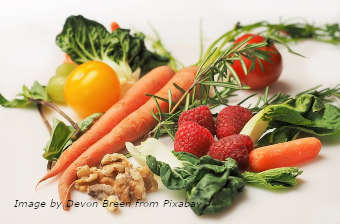
In short, whole foods are foods in their natural state. Further explained, they are foods that are not processed at all or processed as little as possible and are free from additives or artificial substances.
While whole foods can be called natural foods, it ain’t the same as organic foods (will leave this for a future article).
The idea of eating whole or natural foods started in the early 1970s. It was mostly promoted by cookbook writers.
Here are two examples:
- Eleanor Levitt authored The Wonderful World of Natural Food Cookery which dismissed processed foods such as readymade dinners, cookie mixes and cold cuts as being full of preservatives and other “chemical poisons”.
- Jean Hewitt, an English-American food writer and home economist is known for her advocacy of natural foods, authored the New York Times Natural Foods Cookbook, an influential cookbook on the use of natural foods. This cookbook offered “the textures, tastes and nutritional benefits of the natural, fresh foods that grandmother knew”.
These cookbooks are still available on Amazon. If you like to take a closer look, click on the affiliate link* or image below.
*When you purchase, I receive a small commission at no extra cost to you.
Why is Eating Whole Foods Important
Foods in their most natural form naturally give you the maximum amount of original nutrients. Have you not heard countless times your parents, even your grandparents telling you to eat your veggies when you were younger?
Whole foods are the opposite of processed food. I’m sure you’re aware, processed foods have added sugar, starches, flavourings and other manufactured ingredients which some are unpronounceable.
A Quick Look at the History of Food Processing
The mass production and processing of food were introduced in the late 18th and 19th centuries and mainly cater to the military. This was to preserve food for troops and subsequently contributed to future food processing and preservation techniques such as canning.
Severe malnourishment during The Great Depression and influenza outbreak in the early 20th century saw another mass food production surge. This time around, it focused on providing protein-rich and vitamin-fortified foods to the affected population.
In the second half of the 20th century, middle-class mothers and working wives became the primary target for food manufacturers. Convenience food, a perceived value of time, was used by marketers to entice this group of audiences.
Food Processing, Now
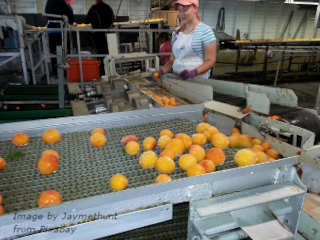
Now, in the 21st century, mass food processing still serves a vital role. How would you get to enjoy foods from other parts of the world, even within a country, if not processed? Not forgetting those living in urban areas.
In other words, consumers around the world would be limited to food types that are produced locally.
Having access to a greater variety of foods allow people to gain a broader mix of nutrients.
People’s eating habits have changed over time. Although convenience is still an important factor, health and quality are equally important if not more. Increased risks of modern lifestyle diseases lead consumers to be more health-conscious than ever before.
On top of that, emerging food trends and diet plans influence people’s food choices and intake. From organic, non-GMO to diet plans such as keto, low-carb, plant-based and Whole30, many of these trends supposedly help maintain or improve your well-being and the diet plans for weight control.
In today’s topic, the importance of eating whole foods should not be taken as a diet meal on a limited-time basis but rather a long-term healthy eating habit.
Why Eat Whole Foods. The Benefits
Processed food, no matter how healthy as advertised by food companies can never be compared with whole foods that are in their most natural form.
Here are reasons to eat whole foods, real natural food.
1. Loaded with Nutrients
You’re eating food in its natural state, unrefined and unprocessed. This means getting the maximal nutrients out of these foods. A very good example is between an apple and apple juice or apple sauce.
In food processing, including cooking preparation, nutritional quality is affected. Take blanching for example. Vitamins and minerals are lost due to leaching.
In food manufacturing, milling and extrusion processing are commonly used and can cause the physical removal of minerals.
As the degree of processing and refining increases, the food’s nutritional value decreases.
Vitamins and minerals are nutrients that your body needs to work properly. It is in whole foods you’ll find aplenty.
2. High in Healthy Fats
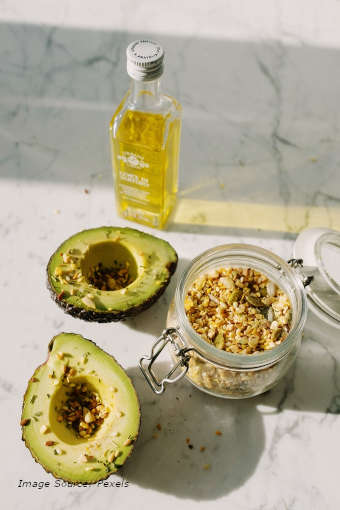
Not all fats are bad fat.
Processed or trans fats such as those found in vegetable oils and spreads are bad fats. Naturally occurring fats found in whole foods are better to have.
By replacing bad fats with healthy fats, your body can benefit from healthy fats for example lowering the risk of developing heart conditions.
To give an example. Extra virgin olive oil is a great source of oleic acid, a type of monounsaturated fat that promotes heart health. (1)
Other food examples that contain a high amount of healthy fats are avocado, nuts and seeds. Read more about fats here.
3. Rich in Antioxidants
Antioxidants help fight free radicals that can damage your body’s cells and cause diseases. Harmful free radicals are the root cause of many diseases including cardiovascular disease that involves the heart and blood vessels.
Antioxidants are found in all whole foods particularly fresh vegetables and fruits. Fresh, unprocessed animal foods also contain antioxidants although in lower levels.
An example. Eggs contain the phytochemicals lutein and zeaxanthin, which act as antioxidants and are thought to provide potential benefits in reducing the risk of some chronic diseases. (1)
4. Good Source of Fibre
Fibre plays a major role in your digestive health and it does more than that.
Other health benefits include weight control, reducing the risk of type 2 diabetes and have a healthier gut. (1, 2, 3)
Consuming fibre through whole foods is better than taking supplements as it keeps you fuller longer plus you’re getting the added nutrients from the fruits and vegetables.
5. Low in Sugar
So far, you’ve been reading whole foods are high in fibre, high in healthy fats, high in antioxidants and loaded with nutrients. On the contrary, there is something low in whole foods that is good for you – sugar!
Having said that, it does not mean sugar in whole foods is entirely good for you. Why?
Naturally occurring sugar is better than added or refined sugars but it is rather easy to overdo it. In certain health conditions, such as diabetes, caution is needed consuming any sweet foods, processed or natural sugar.
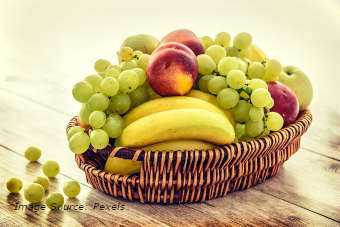
Fruits such as bananas, grapes and cherries, and vegetables such as beets, carrots, potatoes and corns have high amounts of sugar.
Simply put, the sugar found in whole foods is better than the ones in processed foods.
Here’s the difference. When you add a spoonful of table sugar to your morning oatmeal, the sugar turns to fat quickly if not used for energy. Meanwhile, an apple or banana fruit contains other nutrients that affect how your body breaks down sugar. For example, the fibre slows digestion thus prevent sugar spikes.
In brief, good or bad sugar, just remember not to overdo it.
You may like to read this – Dried cranberries have health benefits although high in sugar. Only eating too much is bad for you.
What Are Whole Foods Examples
Whole foods in the form of vegetables include fresh vegetables and fruits, whole grains such as millet, brown rice, quinoa and oats, beans and legumes such as lentils, chickpeas and kidney beans, nuts and seeds.

Whole foods of animal origins include eggs, meat, poultry and seafood.
Would you consider dairy products as whole food? Some would argue only raw or unpasteurized milk is technically “whole”. While I knew of a person who drinks raw milk, it isn’t easily available to us all. Furthermore, the risk of getting foodborne illnesses is high.
I would consider milk as whole food but NOT those flavoured ones. Even the reduced-fat, low-fat or skimmed are further processed and you’ll be surprised the sugar content (added sugar) is higher than full cream milk.
Read more about natural flavourings here. What does natural flavour really mean?
List of Whole Foods to Eat
To help you get started switching to whole foods, here is a list as a guide.
- Vegetables. Asparagus, bell peppers, broccoli, Brussels sprouts, carrots, cauliflower, celery, cucumber, eggplant, kale, spinach, Swiss chard.
- Legumes. Black beans, green beans/string beans, kidney beans, chickpeas, lentils,
- Fruits. Fresh or frozen. Apples, avocado, bananas, blueberries, grapes, grapefruit, kiwi, lemon, oranges,
- Nuts and seeds. Almonds, chia seeds, pumpkin seeds, walnuts.
- Whole grains. Barley, brown rice, oats, quinoa.
- Meat and poultry. Raised without antibiotics or hormones. Lean beef, chicken breast, lamb.
- Fish and seafood. Fresh or frozen. Cod, halibut, salmon, sea bass, snapper, trout, shrimp.
- Dairy products. Cheese, Whole milk, yoghurt.
- Eggs.
When it comes to eating whole foods, it may not be possible to get them all in their natural form. At least, minimally processed is good enough to start with and when combined with fresh vegetables and fruits, you’re on the right track.
In a Nutshell
Mother Nature provided us with the air we breathe, the water we drink, plants used for food and medicine, and many other things we needed to survive.
So then, why are we not eating enough natural whole foods that are known to benefit our health? In today’s modern busy lifestyle, many people choose convenience over health.
However, lately, with the rise of diseases, people are more conscious of the food they consume. Food producers, aware of the needs and expectations of these health-conscious consumers are kept on their toes delivering “better for you” foods.

But then, you should not rely solely on manufactured or processed healthy food. No matter how healthy they seem, they are processed after all. That’s why you should eat whole foods, not processed, to reap the benefits of their natural nutrients.
Now you know what the definition of whole foods is, it’ll be easy for you in choosing what’s best for your health.
This ↓ may help.
At a Glance
| EAT THIS | NOT THAT |
| Fruits and vegetables | Ready-to-eat or convenience foods |
| Meat, poultry and seafood | Refined carbohydrates |
| Milk and some dairy products | Foods with “natural” or artificial flavourings |
| Nuts, seeds and beans | Foods with added or refined sugar |
| Minimally processed foods | Heavily processed foods |
What do you think? Are these easy to follow? I believe it is doable. Tell us in the comments section below what your thoughts are? Would it be difficult for you, switching to whole foods?
Please share this article with anyone you think may find this information useful. Click the share button!
Need MOre help or guidance? These books will get you started right away.
Buy on Amazon US.
For my fellow Malaysians, there are hundreds of cookbooks on healthy cooking using fresh ingredients. A good selection on Shopee by Big Bad Wolf Books. Click here! Takes you directly to BBW.
Happy shopping and thanks for reading.
Me YourHealthy Corner – Stay in Good Health, Healthy Eating Habits
Recent Post You May Be Interested Reading
- The Importance Of Good Hydration For Day-to-day Health

- Is Caffeine Good For Health. Or Bad

- About Hydrogenated Oil

- How Healthy is Yoghurt

- Curbing the Cravings. How to Stop Snacking Between Meals
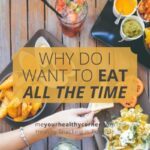
- Is Hazelnut Good For Health
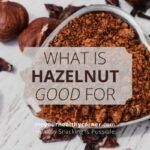
Disclosure: This blog post contains affiliate links as part of the Amazon.com Services LLC Associate Programs and other affiliate services. This means that meyourhealthycorner.com receives a small commission by linking to amazon.com and other sites at no extra cost to the readers.
Medical Disclaimer: I am not a doctor or medical professional, and this post should not be taken as medical advice. Please do your own research. The material on this blog is provided for informational purposes only. It is general information that may not apply to you as an individual and is not a substitute for your own doctor’s medical care or advice.

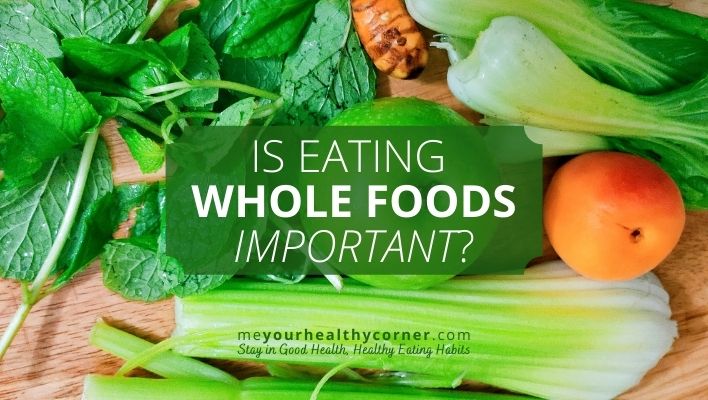


I love to cook at home and I must say I try to avoid any food that comes in a box ready to eat, as I’m looking for make more changes on my diet to be healthier, I was looking for learn more about why should we eat whole foods, and I’m glad I found your article today as it helped me to learn more about what are whole foods and how to add them in my diet. I’m sure your article will help many to make healthy changes on their diets.
You’re definitely on the right path to a healthier diet, Alejandra. Glad this article is of further help to what you’ve been practising. I believe making changes in smaller steps day by day would bring better results than a sudden change. At least, one would not feel overwhelmed without the convenience of ready to eat food.
I knew that eating whole foods is a healthier choice than consuming processed foods but I learned so much reading your article about all the benefits whole foods actually provide!! It is so important indeed to eat enough whole natural foods now that it is a fact that most processed foods are cancerous & full of additives, preservatives and sugar. Thank you, that was very helpful !
Thanks for reading and commenting.
To stay in good health, healthy eating habits is a must. Avoiding processed food and choosing whole foods is a good start.